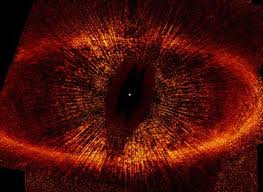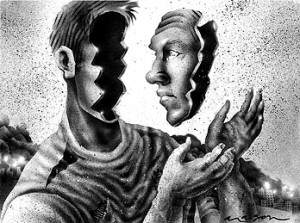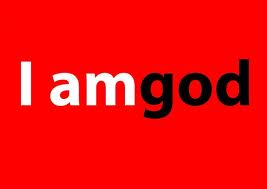World Spirituality Unplugged: “All Religions are Not the Same!!!”
In this 2010 video from the Center for World Spirituality archives, Dr. Marc Gafni articulates a vision for World Spirituality based on a ranking of worldviews into a new hierarchy of truth, beauty, and goodness. He says, in part:
There are two people today. Ethnocentric = my nationality, my religion, my group has got it going on. Augustine: there is no redemption outside of the church. There are about 30 percent of the world that have transcended: trance-ended. That’s how I like to teach that word. To end the trance of. They have ended the trance of the ethnocentric context that says our system is the superior system. A lot of people who are holding that belief including many people who are very loving and beautiful are still holding that belief.

 According to Hayyim Vital, the premier student and mystical partner to Isaac Luria, leader of the great renaissance school of Kabbalah in Safed:
According to Hayyim Vital, the premier student and mystical partner to Isaac Luria, leader of the great renaissance school of Kabbalah in Safed:

 Divinity has one ultimate secret, which it will also whisper in your ear if your mind becomes quieter than the fog at sunset: the God of this world is found within, and you know it is found within: in those hushed silent times when the mind becomes still, the body relaxes into infinity, the senses expand to become one with the world–in those glistening times, a subtle luminosity, a serene radiance, a brilliantly transparent clarity shimmers as the true nature of all manifestation, erupting every now and then in a compassionate Radiance before whom all idols retreat, a Love so fierce it adoringly embraces both light and dark, both good and evil, both pleasure and pain equally; for “I make the Light to fall on the good and bad alike; I the Lord do all these things”; a passionately embroiling Heat so painful it will melt your bones while you hurl yourself to the ground with awe and supplication and reverence and surrender.
Divinity has one ultimate secret, which it will also whisper in your ear if your mind becomes quieter than the fog at sunset: the God of this world is found within, and you know it is found within: in those hushed silent times when the mind becomes still, the body relaxes into infinity, the senses expand to become one with the world–in those glistening times, a subtle luminosity, a serene radiance, a brilliantly transparent clarity shimmers as the true nature of all manifestation, erupting every now and then in a compassionate Radiance before whom all idols retreat, a Love so fierce it adoringly embraces both light and dark, both good and evil, both pleasure and pain equally; for “I make the Light to fall on the good and bad alike; I the Lord do all these things”; a passionately embroiling Heat so painful it will melt your bones while you hurl yourself to the ground with awe and supplication and reverence and surrender. God is the possibility of possibility – limitless imagination. The first of the ten commandments is “I am God.” When this God is asked to identify himself, He responds, “I will be what I will be.” That is, ”˜You cannot capture me in the frozen image of any time or place. To do so would be to destroy me.’ It would be to violate the second commandment against idolatry. Idolatry is the freezing of God in a static image. To freeze God in an image is to violate the invitation of the imagination. It is to limit possibility.
God is the possibility of possibility – limitless imagination. The first of the ten commandments is “I am God.” When this God is asked to identify himself, He responds, “I will be what I will be.” That is, ”˜You cannot capture me in the frozen image of any time or place. To do so would be to destroy me.’ It would be to violate the second commandment against idolatry. Idolatry is the freezing of God in a static image. To freeze God in an image is to violate the invitation of the imagination. It is to limit possibility. Whether the relationship is that of a servant to his master or a lover and his beloved or a relationship between partners or even friends, they are all “relating” to God.
Whether the relationship is that of a servant to his master or a lover and his beloved or a relationship between partners or even friends, they are all “relating” to God. Sacred hermeneutic is ultimately an erotic act according to the mystics in which the God in the interpreter meets the God and the text and realizes that they are one.
Sacred hermeneutic is ultimately an erotic act according to the mystics in which the God in the interpreter meets the God and the text and realizes that they are one. Every evolved culture and every evolved individual may realize Unique Self when True Self awakens to its Unique Perspective. An early expression of this equation is sourced in pre-modernity in the great teachings of the Kabbalists. For these masters, the sacred text of the Torah is the word of God. Yet, paradoxically, in Hebrew mystical teaching a human being who is deeply grounded in True Self while fully incarnating his or her own uniqueness, also speaks the word of God!
Every evolved culture and every evolved individual may realize Unique Self when True Self awakens to its Unique Perspective. An early expression of this equation is sourced in pre-modernity in the great teachings of the Kabbalists. For these masters, the sacred text of the Torah is the word of God. Yet, paradoxically, in Hebrew mystical teaching a human being who is deeply grounded in True Self while fully incarnating his or her own uniqueness, also speaks the word of God! R. Kook, twentieth century philosopher mystic, teaches that every generation is part of the unfolding revelation of divinity. Each generation, picking up from where the last one left off, moves closer to understanding the full depth and divinity of sacred rites and passages. In this sense the “covenant between me and the children of Israel” is not only between God and the people – but “between” the children of Israel”. and their children ….and their children – a covenant between generations. Israel means for me, borrowing a reading from my teacher Mordechai Lainer of Izbica, based on a close and creative reading of the original Hebrew, Yashar El; the direct apprehension of the divine.
R. Kook, twentieth century philosopher mystic, teaches that every generation is part of the unfolding revelation of divinity. Each generation, picking up from where the last one left off, moves closer to understanding the full depth and divinity of sacred rites and passages. In this sense the “covenant between me and the children of Israel” is not only between God and the people – but “between” the children of Israel”. and their children ….and their children – a covenant between generations. Israel means for me, borrowing a reading from my teacher Mordechai Lainer of Izbica, based on a close and creative reading of the original Hebrew, Yashar El; the direct apprehension of the divine. Even though you and I might deeply believe that the most important function we can perform is to offer auhentic transformative spirituality, the fact is, much of what we have to do, in our capacity to bring decent spirituality into the world, is actually to offer more benign and helpful modes of translation. In other words, even if we ourselves are practicing, or offering, authentic transformative spirituality, nonetheless much of what we must first do is provide most people with a more adequate way to translate their condition. We must start with helpful translations, before we can effectively offer authentic transformations.
Even though you and I might deeply believe that the most important function we can perform is to offer auhentic transformative spirituality, the fact is, much of what we have to do, in our capacity to bring decent spirituality into the world, is actually to offer more benign and helpful modes of translation. In other words, even if we ourselves are practicing, or offering, authentic transformative spirituality, nonetheless much of what we must first do is provide most people with a more adequate way to translate their condition. We must start with helpful translations, before we can effectively offer authentic transformations. God is called in biblical myth “Shadai,” translated by the wisdom masters as, “He who said to his world, ”˜Dai’ – enough.” Two meanings well up from the word. The first is that the creative process was stopped when God said enough. Divinity turned to humanity and said, “I have done enough. You – each one of you – be my partners in completing the work of creation.” Have you ever created something, conceived of a project and then handed over responsibility for it to another. You have to really trust that person to “entrust” to them Your creation. The phrase “Raba Emunatecha” – from the Hebrew liturgy, literally means “Your trust is great.” I read it to mean that God’s trust IN US is great. God entrusts creation into our hands.
God is called in biblical myth “Shadai,” translated by the wisdom masters as, “He who said to his world, ”˜Dai’ – enough.” Two meanings well up from the word. The first is that the creative process was stopped when God said enough. Divinity turned to humanity and said, “I have done enough. You – each one of you – be my partners in completing the work of creation.” Have you ever created something, conceived of a project and then handed over responsibility for it to another. You have to really trust that person to “entrust” to them Your creation. The phrase “Raba Emunatecha” – from the Hebrew liturgy, literally means “Your trust is great.” I read it to mean that God’s trust IN US is great. God entrusts creation into our hands. Love implies not only freedom but responsibility – awesome responsibility. Remember Master Menachem Mendel who was asked by his students, “Rebbe (teacher), where is God?” The master responds, “God is only where you let him in.”
Love implies not only freedom but responsibility – awesome responsibility. Remember Master Menachem Mendel who was asked by his students, “Rebbe (teacher), where is God?” The master responds, “God is only where you let him in.” By
By  “It is written that God withdraws his presence from the world to dwell in the empty space between the Cherubs in the Temple. But how could this be? Is it not also written that all of heaven, indeed all the space in the cosmos, is not enough to contain divinity? “Ah,” says Master Jose. “It is to be likened to lovers. When they quarrel even a palatial home is not enough for their needs, but when they love, they can make their bed even on the edge of a sword.”
“It is written that God withdraws his presence from the world to dwell in the empty space between the Cherubs in the Temple. But how could this be? Is it not also written that all of heaven, indeed all the space in the cosmos, is not enough to contain divinity? “Ah,” says Master Jose. “It is to be likened to lovers. When they quarrel even a palatial home is not enough for their needs, but when they love, they can make their bed even on the edge of a sword.” This is the second installment of World Spirituality Unplugged, a regular new column on this website which will feature highlights from the Center for World Spirituality’s substantial audio and video archives. The audio clip posted here (less than 10 minutes) is an excerpt from a 2010 dialogue between John Mackey and Marc Gafni, originally recorded for the Future of Love Teleseries, an online event co-sponsored by CWS.
This is the second installment of World Spirituality Unplugged, a regular new column on this website which will feature highlights from the Center for World Spirituality’s substantial audio and video archives. The audio clip posted here (less than 10 minutes) is an excerpt from a 2010 dialogue between John Mackey and Marc Gafni, originally recorded for the Future of Love Teleseries, an online event co-sponsored by CWS. This spiritual law of the universe plays itself out in many hidden ways which you need to recognize if you truly want to return to love. I want to outline for you areas where, in order to become a lover, you need to give up control. Just as the Hebrew mystics portrayed the God lover as stepping back in order to make space for world, so do we need to step back to create space for our love to flow. First, if we love ourselves, we have to give up our need to be perfect. If you don’t love yourself then you expect perfect self control. If you do love yourself, then you have to allow room for imperfection and failure. Emerson was right when he wrote, “There is a crack in everything that God has made.”
This spiritual law of the universe plays itself out in many hidden ways which you need to recognize if you truly want to return to love. I want to outline for you areas where, in order to become a lover, you need to give up control. Just as the Hebrew mystics portrayed the God lover as stepping back in order to make space for world, so do we need to step back to create space for our love to flow. First, if we love ourselves, we have to give up our need to be perfect. If you don’t love yourself then you expect perfect self control. If you do love yourself, then you have to allow room for imperfection and failure. Emerson was right when he wrote, “There is a crack in everything that God has made.” The pseudo-victim has genuine options which she refuses to action; she refuses to turn fate into destiny and cries more than it hurts. Another kind of pseudo-victim also may have some level of real hurt but more often than not the hurt is more imagined than real and being a victim is a freely chosen role which has many hidden benefits which the pseudo-victim seeks to exploit. The hidden victims of pseudo-victims therefore are real victims.
The pseudo-victim has genuine options which she refuses to action; she refuses to turn fate into destiny and cries more than it hurts. Another kind of pseudo-victim also may have some level of real hurt but more often than not the hurt is more imagined than real and being a victim is a freely chosen role which has many hidden benefits which the pseudo-victim seeks to exploit. The hidden victims of pseudo-victims therefore are real victims.